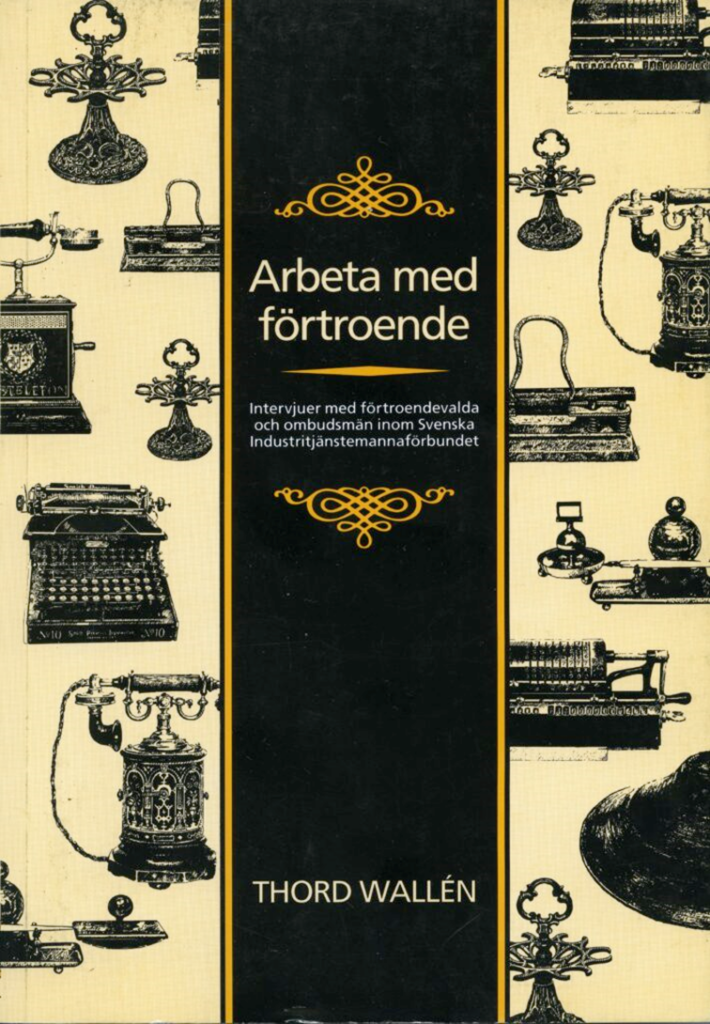Posted on October 16, 2023 by Leif Jacobsson
What does it mean to work as an elected representative? In a book from 1990 entitled ”Arbeta med förtroende” (Eng. ”Working with Trust”), the first head of TAM-Arkiv, Thord Wallén, interviewed union representatives and ombudsmen.

The book was part of TAM’s early ambition to draw attention to the history of white- collar workers and the white-collar workers’ movement. In the book, we get to meet elected representatives and ombudsmen at the regional level. The interviewees had been members of the trade union SIF. The questions posed by Wallén revolve around the interviewees’ memories of and experiences of working life, trade unions and society in a broader sense. The project was part of the documentation of white-collar memories that TAM was conducting at this time (1980s, early 1990s). The project was initiated, commissioned and paid for by Svenska Industritjänstemannaförbundet, SIF.
By compiling his in-depth interviews, Wallén wanted to highlight the lives of individuals in the everyday life of work and the trade unions as depicted by themselves. In his writing, the author allows the interviewees to speak through short quotations or quickly sketched situational pictures. In this way, conditions, thinking and values during their working and trade union active years are illustrated. The contact with each of them in the first chapter is as fragmentary as in personal encounters. In the second chapter – which includes the interviews – the interviewees appear separately in it, in Wallén’s own words, ”the unique whole that a human being constitutes”.
The interviewees were all born quite early in the last century, in 1907 and 1928. The interviewees’ experiences had been influenced by the economic and political crises of the 1930s and 40s. Both decades were marked by anxiety and insecurity. For civil servants and officials, however, there were some positive events during the 1930s. They succeeded in bringing about a concerted effort that led to the formation of two central organizations, Daco (De anställdas centralorganisation, Eng. The federation of employees) and one for civil servants and officials employed by municipalities (old TCO). Daco also managed to get a decision in the Riksdag on the law on the right of association and negotiation.
Half of the interviewees began their working lives in the way that was common in the early decades of the 20th century – as errand boys. In a couple of cases, people took on such a modest tenure right after school, and after a year or so they got a ”real” job. All of the interviewees had applied to – and stayed – at large companies. Some say that they were looking for security in order to possibly escape the great unemployment that characterized the 1920s and 30s.
For the interviewees, early union membership was something obvious. It was based on both ”social heritage” and the parents’ own trade union consciousness. This awareness was strengthened in the face of the realities of working life.
All of the interviewees had held positions of trust in trade unions, usually for a long time. Four of them had rounded off their trade union careers as employed branch ombudsmen. Their union values are clearly evident in the interviews. They themselves had participated in the work of setting up trade union clubs at their workplaces and had – both in word and deed – demonstrated the need for union activities. The interviewees had also followed up their initiatives through information and recruitment of unorganized personnel and for long periods of their lives held prominent union assignments.
The book ”Working with Confidence”/”Arbeta med förtroende” is an interesting document, which depicts a certain era, that also shows that the union successes have not been achieved without effort. When the book’s interviewees were younger, the workplace laws we take for granted today did not exist. They have come about through hard struggle in the past, in which union representatives played a crucial role.
Literature: Thord Wallén. Arbeta med förtroende: Intervjuer med förtroendevalda och ombudsmän inom Svenska Industritjänstemannaförbundet. Stockholm, 1990.